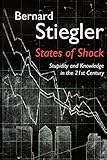States of shock : stupidity and knowledge in the twenty-first century / Bernard Stiegler ; translated by Danie Ross.
Material type: TextLanguage: English Original language: French Publisher: Cambridge ; Malden, MA : Polity, 2015Description: 280 pages ; 24 cmISBN:
TextLanguage: English Original language: French Publisher: Cambridge ; Malden, MA : Polity, 2015Description: 280 pages ; 24 cmISBN: - 9780745664941 (pbk. : alk. paper)
- 0745664946 (pbk. : alk. paper)
- 9780745664934 (hbk. : alk. paper)
- 0745664938 (hbk. : alk. paper)
- Etats de choc. English
- 194
- B 2430 S855s 2015
| Item type | Current library | Home library | Collection | Shelving location | Call number | Copy number | Status | Date due | Barcode |
|---|---|---|---|---|---|---|---|---|---|
 Libro
Libro
|
Biblioteca Juan Bosch | Biblioteca Juan Bosch | Humanidades | Humanidades (4to. Piso) | B 2430 S855s 2015 (Browse shelf(Opens below)) | 1 | Available | 00000120111 |
Includes bibliographical references and index.
Pharmacology of stupidity : introduction to the poststructuralist epoch. Unreason
Doing and saying stupid things in the twentieth century
Différance and repetition : thinking différance as individuation
Après coup, the differend
Reading and re-reading Hegel after poststructuralism
Re-reading the Grundrisse : beyond two Marxist and poststructuralist misunderstandings
The university with conditions. The new responsibilities of the university : in the global economic war
Internation and interscience
Interscience, intergeneration and university autonomy
In 1944 Horkheimer and Adorno warned that industrial society turns reason into rationalization, and Polanyi warned of the dangers of the self-regulating market, but today, argues Stiegler, this regression of reason has led to societies dominated by unreason, stupidity and madness. However, philosophy in the second half of the twentieth century abandoned the critique of political economy, and poststructuralism left its heirs helpless and disarmed in face of the reign of stupidity and an economic crisis of global proportions. New theories and concepts are required today to think through these issues. The thinkers of poststructuralism Lyotard, Deleuze, Derrida must be re-read, as must the sources of their thought, Hegel and Marx. But we must also take account of Naomi Klein's critique of Milton Friedman and the Chicago School and her account of the shock doctrine. In fact, argues Stiegler, a permanent state of shock has prevailed since the beginning of the industrial revolution, intensified by the creative destruction brought about by the consumerist model. The result has been a capitalism that destroys desire and reason and in which every institution is undermined, above all those institutions that are the products par excellence of the Enlightenment the education system and universities. Through a powerful critique of thinkers from Marx to Derrida, Stiegler develops new conceptual weapons to fight this destruction. He argues that schools and universities must themselves be transformed: new educational institutions must be developed both to take account of the dangers of digitization and the internet and to enable us to take advantage of the new opportunities they make available.


There are no comments on this title.